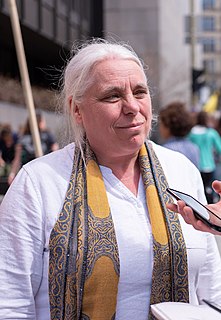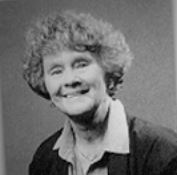
The Marche mondiale des Femmes or World March of Women is an international feminist movement that advocates for gender equality and aims to take action against discrimination against women and reduce violence towards them. [1]

The Marche mondiale des Femmes or World March of Women is an international feminist movement that advocates for gender equality and aims to take action against discrimination against women and reduce violence towards them. [1]
The Marche mondiale des Femmes was launched in 2000 by the Fédération des femmes du Québec, a feminist organisation based in Quebec, Canada. [2] The idea came from a previous event, the Women's March Against Poverty, which took place in 1995, also in Québec. This involved some 2,500 women in three groups marching for ten days before presenting nine demands to the authorities relating to economic justice. [1]
Planning for the Marche mondiale des Femmes began in 1997, and in October 1998, a meeting was held in Montréal, Canada, in which 140 women representing 65 countries took part. They agreed to two main themes for the march: the elimination of world poverty and the cessation of violence towards women. [1]
The march started on 8 March 2000, International Women's Day, and ended on 17 October, International Day for the Eradication of Poverty. Marches took place in several countries including Bombay and Brussels. In New York, a petition was handed to United Nations representatives setting out proposals that would help eliminate the problems of world poverty and domestic violence. The march has become an annual event in many cities across the world. [3]

The École Polytechnique massacre, also known as the Montreal massacre, was a mass shooting in Montreal at an engineering school affiliated with the Université de Montréal. Fourteen women were murdered and ten women and four men were injured.
Ni Putes Ni Soumises is a French feminist movement, founded in 2002, which has secured the recognition of the French press and the National Assembly of France. It is generally dependent on public funding. It is also the name of a book written by Fadela Amara, one of the leaders of the movement, with the help of Le Monde journalist Sylvia Zappi.

The National Day of Remembrance and Action on Violence Against Women, also known informally as White Ribbon Day, is a day commemorated in Canada each December 6, the anniversary of the 1989 École Polytechnique massacre, in which armed student Marc Lépine murdered fourteen women and injured ten others in the name of "fighting feminism". The commemoration date was established by the Parliament of Canada in 1991. The legislation was introduced in the House of Commons as a private member's bill by Dawn Black, Member of Parliament for New Westminster-Burnaby, British Columbia, and received all-party support.

Françoise David is a former spokesperson of Québec solidaire – a left-wing, feminist, and sovereigntist political party in the province of Quebec, Canada. She was elected to serve as the Member of the National Assembly of Quebec for the riding of Gouin in the 2012 Quebec election, and then again in the 2014 Quebec election. Quebec Solidaire was born from the merger of Option Citoyenne with l'Union des Forces Progressistes. She is the author of the book/manifesto Bien commun recherché – une option citoyenne which attempts to combine the concepts of "common good", social justice, ecology and economic democracy into a coherent political doctrine. On January 19, 2017, Françoise David announced her immediate retirement as both party spokesperson and as a Member of the National Assembly due to her health.

The women's liberation movement (WLM) was a political alignment of women and feminist intellectualism that emerged in the late 1960s and continued into the 1980s primarily in the industrialized nations of the Western world, which affected great change throughout the world. The WLM branch of radical feminism, based in contemporary philosophy, comprised women of racially- and culturally-diverse backgrounds who proposed that economic, psychological, and social freedom were necessary for women to progress from being second-class citizens in their societies.

Charlotte Bunch is an American feminist author and organizer in women's rights and human rights movements. Bunch is currently the founding director and senior scholar at the Center for Women's Global Leadership at Rutgers University in New Brunswick, New Jersey. She is also a distinguished professor in the Department of Women's and Gender Studies at Rutgers.
The United Nations General Assembly has designated November 25 as the International Day for the Elimination of Violence Against Women. The premise of the day is to raise awareness of the fact that women around the world are subject to rape, domestic violence and other forms of violence; furthermore, one of the aims of the day is to highlight that the scale and true nature of the issue is often hidden. For 2014, the official Theme framed by the UN Secretary-General’s campaign UNiTE to End Violence against Women, is Orange your Neighbourhood. For 2018, the official theme is "Orange the World:#HearMeToo" and for 2019 it is "Orange the World: Generation Equality Stands Against Rape".
The Fédération des femmes du Québec (FFQ) is a feminist organization binding individuals and groups in a common goal to "promote and defend the interests and the rights of women and to fight against all forms of violence, discrimination, marginalization and exclusion towards women" in Quebec, Canada.
The anti-austerity movement refers to the mobilisation of street protests and grassroots campaigns that has happened across various countries, especially in Europe, since the onset of the worldwide Great Recession.

Manon Massé is a politician in Quebec and one of the two current leaders for Québec solidaire since 2017. She has represented Sainte-Marie–Saint-Jacques in the National Assembly of Quebec since the 2014 general election. Before her time in political office, she was a community organizer and one of the co-founders for the political movement Option citoyenne.

Claire Bonenfant was a Canadian politician and champion of feminist rights. A Chevalier of the Ordre national du Québec, Bonenfant was president of the Quebec Status of Women Council. The University of Laval's "Claire Bonenfant Chair in Women's Studies" is named in her honour.
Ghislaine Nelly Huguette Sathoud is a Congolese feminist, primarily concerned with domestic violence.
Ourida Chouaki was an Algerian women's rights activist. Founder of an association campaigning for reform to the Algerian Family Code she coordinated the 20 ans, barakat! which successfully brought about the replacement of the law in 2004. She also worked for the Marche mondiale des Femmes.
Léonie Couture is a Canadian feminist activist. She is the founder and director of Herstreet, an organization designed to help homeless women, mainly in the Montreal area.

Azilda Lapierre Marchand was a Québécoise teacher and women's rights advocate, who worked to change the perception of women and their roles in French-Canadian society. Recognizing that many women worked as unpaid labourers either within the family or within family businesses, she became a vocal advocate for their service to be recognized as valuable. A founding member of the Women's Association for Education and Social Action, she served as president of the organization between 1970 and 1975. Participating in numerous international conferences and government commissions, she advocated for improved access to education and civil participation by women. She was a recipient of the Order of Canada and honoured as a knight in the National Order of Quebec.
Hélène Pedneault was a Québécoise writer of many mediums who contributed much to the advancement of the feminist cause and also to Quebec sovereignty and the environment.

Caroline Dessaulles-Béique was a Canadian social activist and feminist. She was one of the founders of the Provincial Housewife's School, which later became the home economics department of the Université de Montréal, and an advocate who pressed for the founding of juvenile courts. She was a co-founder of the first national feminist organization, the National Federation of Saint John the Baptist for French-speaking Canadian women.

The Women's liberation movement in North America was part of the feminist movement in the late 1960s and through the 1980s. Derived from the civil rights movement, student movement and anti-war movements, the Women's Liberation Movement took rhetoric from the civil rights idea of liberating victims of discrimination from oppression. They were not interested in reforming existing social structures, but instead were focused on changing the perceptions of women's place in society and the family and women's autonomy. Rejecting hierarchical structure, most groups which formed operated as collectives where all women could participate equally. Typically, groups associated with the Women's Liberation Movement held consciousness-raising meetings where women could voice their concerns and experiences, learning to politicize their issues. To members of the WLM rejecting sexism was the most important objective in eliminating women's status as second-class citizens.

Louise Toupin is a Canadian political scientist and specialist in feminist studies. She was a founding member of the Women's Liberation Front of Quebec (fr) and Éditions du remue-ménage (fr), which were important sites of feminist activism in the late 1960s and early 1970s in Montreal. She then earned a PhD from the Université du Québec à Montréal, later becoming a lecturer at that same institution. Her research focused on collections and analyses of feminist theory from the recent history of Québec.